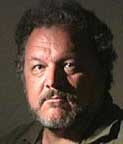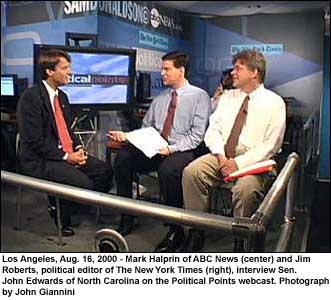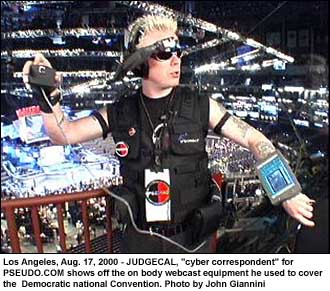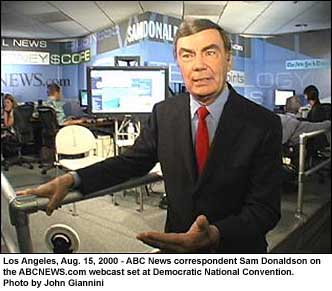The 2000 political campaigns have seen an explosion in the use of the Internet to get the message out. Be it news organizations, politicians, or groups pushing one political agenda or another, the message appears to be if they are not on the Internet they are not in the game.
At the opposite end of the reporting spectrum was Pseudo.com's cyber-correspondent "JUDGECAL," who resembled an action hero commando more than a political reporter. In black combat gear he prowled the convention hall and demonstration areas, streaming unedited video. He wore a black vest which carried the computer processing unit and power packs. On one wrist he wore a keyboard and on the other he had a touch screen LCD.
Voter.com, where the motto is "bringing democracy to your desktop," provided some of the most entertaining and useful bits of political debate going on at the Democratic National Convention. Every morning at 10:30 Democratic pollster Celinda Lake and Republican pollster Ed Goeas briefed the press on the overnight polling, which gauged voter reaction to convention events, particularly speeches by the candidates. They would then offer their own political spin on those results. Randy Tate, director of Republican outreach at Voter.com describes their operation as "relentlessly bipartisan," which he backs up by sighting some of their charter members - the Christian Coalition and People for the American Way. The site is a bonanza for political junkies with information on hundreds of candidates and races, plus links to other political sites and articles by such varied political commentators as P.J. O'Rourke and Jack Germond. Ed Goeas summed up the growth of the Internet and politics this way: "Where four years ago at the presidential election we had 40 - 45% of the voters saying they use the Internet at least once a week. We're now up to 63% saying they use the Internet on a regular basis (once a week), and a third of those saying they have used - not will use - the Internet for political information. Goeas feels that increasingly voters want to cut through all the clutter of information. "They are going to the Internet to get information." His opposite number Celinda Lake echoes that view, "I think that the whole Internet polling and Internet voting is probably two cycles away. I think that eight years from now it’s going to have revolutionized politics and we won't even recognize it." Not everyone is impressed by political coverage on websites, however. In an August 18th article in The New York Times, James Carey, a spokesman for PC Data OnLine which tracks Web use, was quoted as follows: "The bridge hasn't yet been made between politics and the Internet. There's not a lot of traffic to these sites. It just isn't working yet." In the same article Chris Hunter, an analyst with NetElection.Org said, "None of the features lived up to the hype." But, Bernard Gwertzman, editor of The New York Times on the Web, takes a more philosophical view and regards video, audio and slide shows as "increasingly important tools" and a "major component" of coverage for future news events. To him, the conventions provided a useful testing ground. "The challenge is going to be to train print journalists" to use these tools. For the time being he sees Web coverage as being a case where "the publishers have been ahead of the audience."
For Donaldson the future is clear: "I think someday not too long from now, everything is going to come across the World Wide Web...so political communications - whether it’s a candidate's speech, the party's platform, or the conventions - will come via the Internet. And I think that's a tremendous change, not only in the scope and the reach of coverage, but in the ease with which people can come on." He goes on, "It’s a great thing. But, whether I thought it a bad thing or a good thing, it wouldn't matter, because you're not going to stop it. "McCluhan had
it right," he concludes. "This is the global village. And can you
imagine that societies that suppress their people will not exist,
they will not be able to exist. I mean you can't stop the Chinese
from coming on the Internet. The Beijing government can't stop them.
You can't stop people in dictatorships (perhaps in Africa or South
American) from coming on the Internet. Can't stop them! Its gonna
be a revolution."
|
|||||

 On
one hand, the mainstream traditional news organizations such as
ABC News and The New York Times have formed alliances and created
special Internet programming during the Republican and Democratic
Conventions. At 10:30 every morning from a set in the Los Angeles
Convention Center, ABCNEWS.com streamed live interviews with politicians
and political operatives on its Political Points program. The interviewers
included David Halprin from ABC and Michael Oreskes, The New York
Times Washington bureau chief. Sam Donaldson and Cokie Roberts of
ABC News had their own back-to-back interview programs, which went
out every afternoon over the net.
On
one hand, the mainstream traditional news organizations such as
ABC News and The New York Times have formed alliances and created
special Internet programming during the Republican and Democratic
Conventions. At 10:30 every morning from a set in the Los Angeles
Convention Center, ABCNEWS.com streamed live interviews with politicians
and political operatives on its Political Points program. The interviewers
included David Halprin from ABC and Michael Oreskes, The New York
Times Washington bureau chief. Sam Donaldson and Cokie Roberts of
ABC News had their own back-to-back interview programs, which went
out every afternoon over the net. His
headgear was a gun sight reticule used on Apache helicopters. This
gave him the illusion of viewing a 17" monitor. While his bizarre
appearance, enhanced by spiked hair and lip jewelry, may have put
off more traditional journalists, his charm and wit made both the
curious and the skeptical available to him. Whether this elicited
any penetrating political analysis remains to be seen. "JUDGECAL"
to Congressman Jerry Nadler: "Congressman would you like to say
something to the folks back home?" Congressman Nadler: "Well I guess
I'll start at the top, Hi Mom."
His
headgear was a gun sight reticule used on Apache helicopters. This
gave him the illusion of viewing a 17" monitor. While his bizarre
appearance, enhanced by spiked hair and lip jewelry, may have put
off more traditional journalists, his charm and wit made both the
curious and the skeptical available to him. Whether this elicited
any penetrating political analysis remains to be seen. "JUDGECAL"
to Congressman Jerry Nadler: "Congressman would you like to say
something to the folks back home?" Congressman Nadler: "Well I guess
I'll start at the top, Hi Mom." One
big question mark in Web journalism has been the changing role of
the editor. Some Web journalists appear confused when the word "editor"
is even mentioned. For them the whole point of the Internet is that
there is no filter between information and the user. However, Sam
Donaldson points out that there will be "millions of websites" all
offering information. It will be the responsibility of the user
to sort reliable information from "junk." He believes that "serious
news organizations will continue to edit their material just as
we do today. Just as The New York Times does. Just as ABC News does."
One
big question mark in Web journalism has been the changing role of
the editor. Some Web journalists appear confused when the word "editor"
is even mentioned. For them the whole point of the Internet is that
there is no filter between information and the user. However, Sam
Donaldson points out that there will be "millions of websites" all
offering information. It will be the responsibility of the user
to sort reliable information from "junk." He believes that "serious
news organizations will continue to edit their material just as
we do today. Just as The New York Times does. Just as ABC News does."